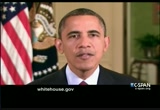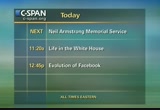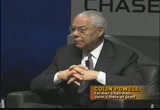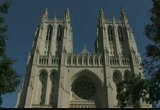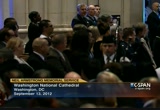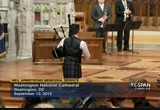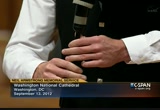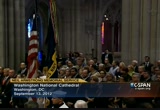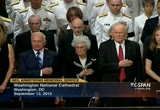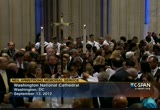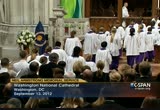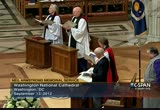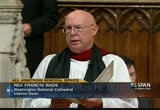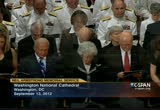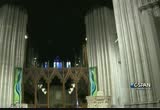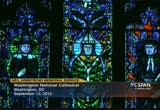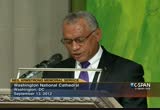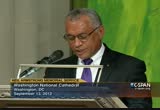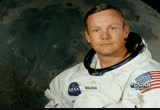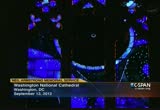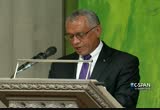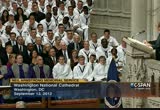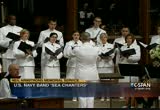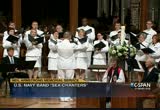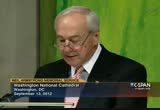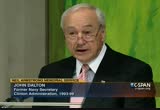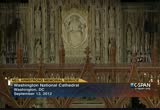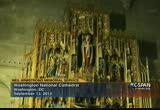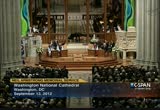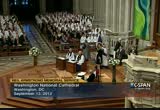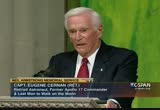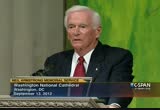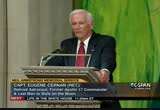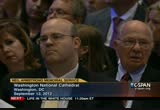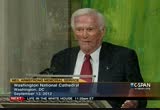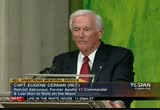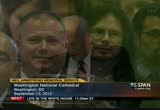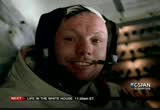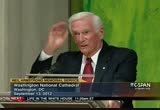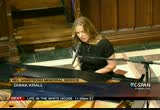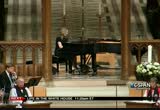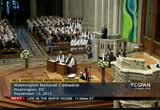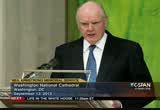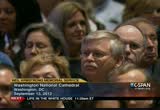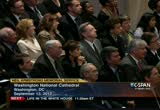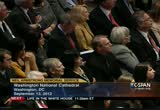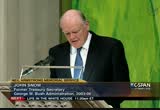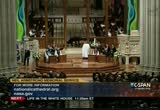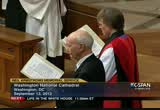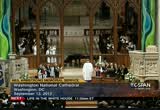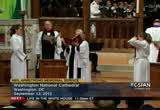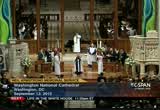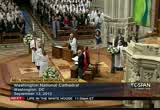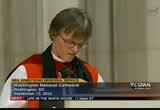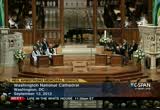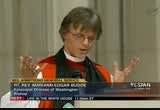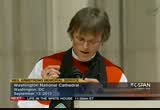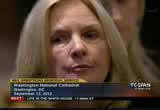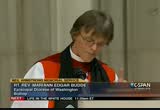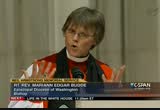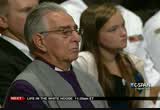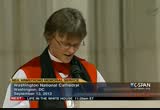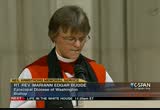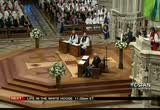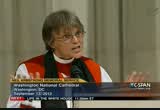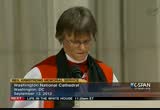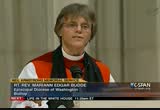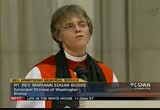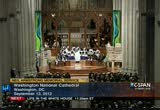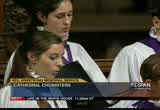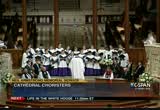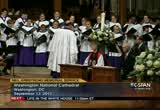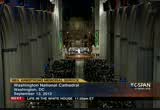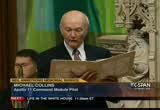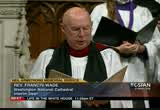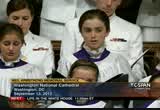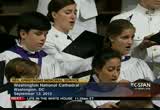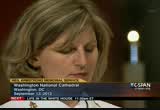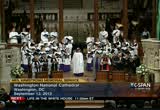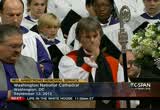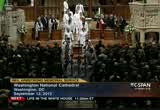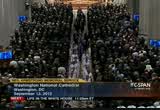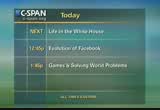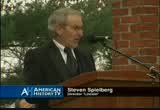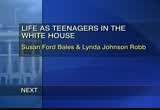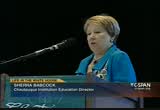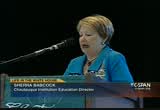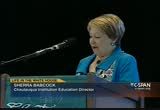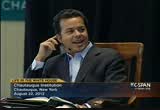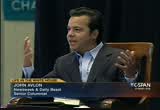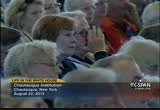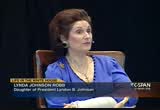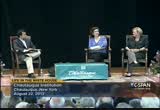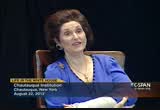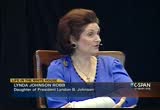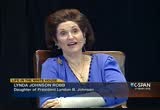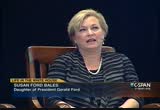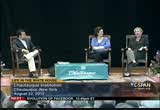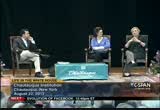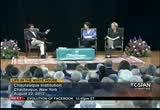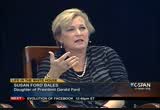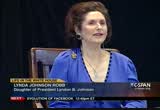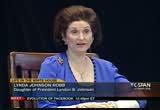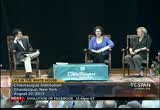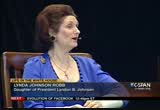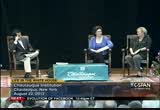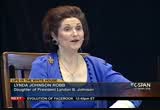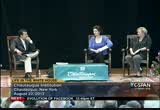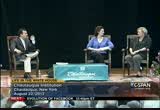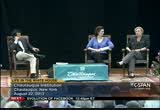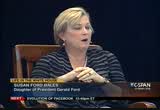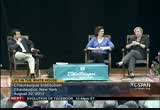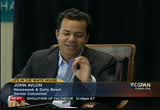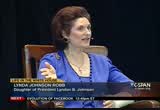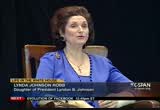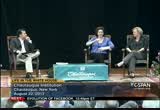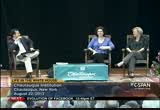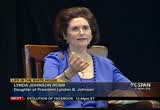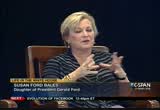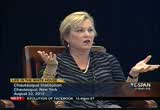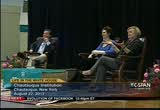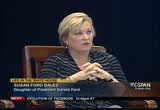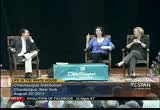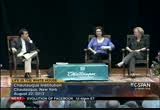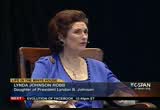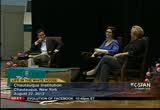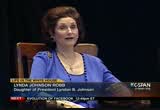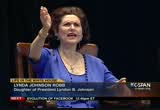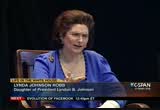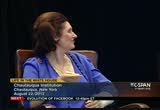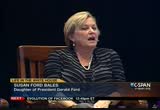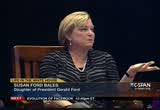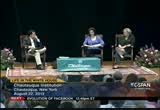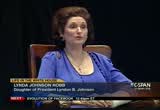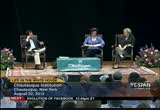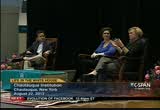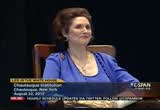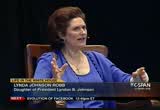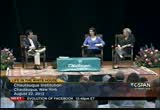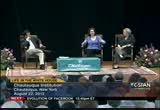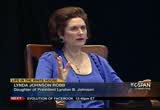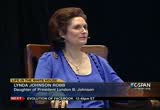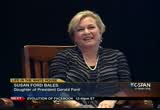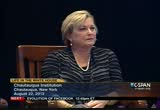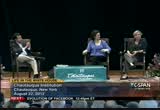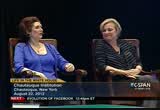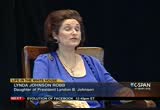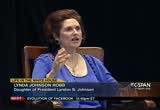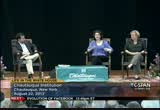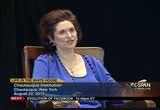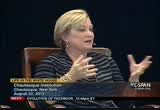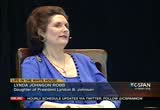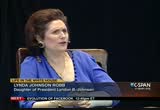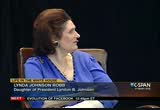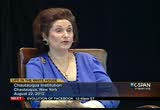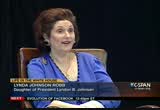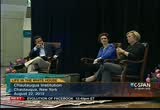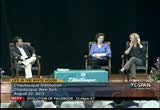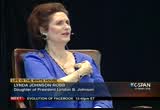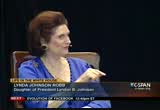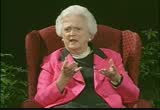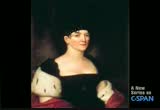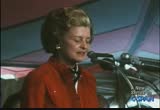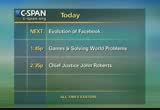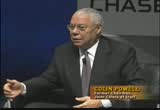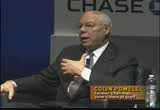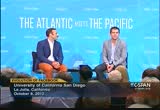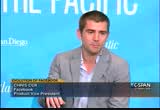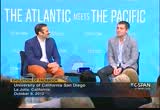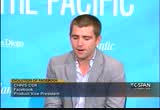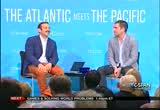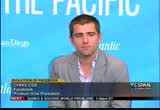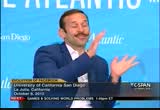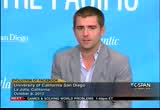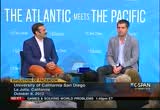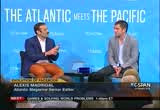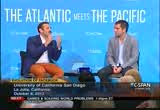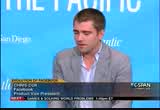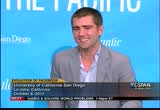tv Public Affairs CSPAN November 22, 2012 10:00am-1:00pm EST
10:00 am
over their heads. these folks could have done nothing and left the rest to someone else pay but that is not what we do. as americans, where a not for the recognition or reward, but because is the right thing to do. here in america, we rise or fall together as one nation and one people. that is something to be grateful for. today, and every day. to all the americans in doing your part to make our world a better place, it is my great privilege to serve as your president. to all our service members, it is my honor to be your commander in chief. from our family to yours, happy thanksgiving. >> coming up on c-span, the memorial service for the first
10:01 am
man to walk on the moon, neil armstrong. he died in august. that is followed by a look at the life of teenagers in the white house. then the evolution of facebook as told by the facebook engineer who created the "like" button, newsfeed, and timeline. >> and you change this army so it becomes a volunteer army, code finder soldiers in the labor market. go find them in the villages and towns in america. we did that. we created a splendid force of young men and women who are willing to serve their country as volunteers. the had the same tradition, the same culture, the same loyalty and dedication as any other generation of americans have ever gone before them. they proved themselves in the gulf war and the panama bay.
10:02 am
they proved themselves in the last 10 years in iraq and afghanistan. we have to keep in mind something that president lincoln said, to care. never forget that they are carrying the american spirit. they are carrying the american traditions with them. when they get injured, when they get hurt, or when they come back to be reintegrated into society, we have to be ready to care for them. not just the federal governments, their fellow citizens. >> more about the trip and of returning veterans with colin powell -- treatment of returning veterans with colin powell at 8:00 p.m. eastern. later, a space pioneers and nasa officials pay homage to the first man to walk on the moon, neil armstrong, just before 11:00.
10:03 am
>> now, the memorial service honoring the life of the late neil armstrong at washington national cathedral in washington, d.c.. mr. armstrong was the first man to walk on the moon. he passed away on august 25. over the next hour and 20 minutes you will hear from nasa administrator charles bolden, apollo 17 astronaut and last man to walk on the moon, capt. eugene cernan, and command pilot michael collins of. -- collins. ♪
10:11 am
10:12 am
where we can in fact hold before caught our grief, our joy, our thanksgiving, and hope your it -- before god our grief, our joy, our thanks giving, and your hope. it is important for us as a nation and community as people to gather here in this place to consider the mysteries of duration, of life, of death, and to give thanks for a life well lived, and for service boldly rendered. that is what we will be doing in this time. i think you for sharing in it. may i call your attention to the order of service before you. glorify, god all you works of god. in the high vault of heaven, glorify god. god of grace and glory, you create and sustain the universe in majesty and duty.
10:13 am
we thank you for all in who you have planted the desire to know your creation, and to explore your work and your wisdom. lead us, like them, to understand better the wonder and mystery of creation through christ, your eternal word, through whom all things were made. amen. [applause] of those who came before us and made certain that this country rose the first wave of the industrial revolution, the first waves of invention, the first wave of nuclear power. this generation does not intend to flounder in the backwash of the coming age of space. we need to lead it. [applause]
10:14 am
the eyes of the world looking to the moon, and the planet beyond, we have vowed that we shall not see it governed by a hostile flag of conquest, but by a banner of freedom and peace. [applause] we choose to go to the moon and do other things not because they're easy, but because they are hard, because that goal will serve to organize and measure the best. that talent is one that we are willing to accept, and when we are unwilling to postpone, and one we intend to win. [applause]
10:15 am
many years ago, agreed risch explored george mallory -- a british explorer george mallory was asked why he wanted to climb everest. he said, because it is there. we're going to climate. new hopes for knowledge and peace are there, and as we set sail, we ask god's blessings for the most hazardous and dangerous and greatest adventure on which man has ever embarked. [applause] thank you. members of the armstrong family, friends here gathered today, when president kennedy challenge this nation to be first on the moon and his historic rice university speech, 50 years ago today -- yesterday, many thought it was an impossible dream. the vision of that young
10:16 am
president was rooted in the knowledge that the american experiment itself was an incredible merkel. the miracle of america was only made possible by men and women of on, and foresight, determination, and courage who dared to turn the once impossible dream of freedom, equality, and democracy into a new and enduring reality. that legacy inspired a young neil armstrong to first interrupt his studies at purdue university to serve his country as a navy fighter pilot. he would later become a and nasa astronaut, later in apollo. he never forgot his navy roots. naval aviation heritage. he lived out his life as an active member of the golden eagles. right after president kennedy's speech, neal was already working on the problem of how to land the flying machine on the moon.
10:17 am
those of us to of had the privilege to fly in space followed the trail he helped forge. america's leadership in space -- space and the confidence that we can go further into the zero known -- unknown and achieve great things as a people rests with the achievement of neil and the brave men with whom he served. neil will always be remembered for taking humankind's first small step on a world beyond our own. it was courage, grace, and humility he displayed throughout his life that lifted him above the stars. neil armstrong left more than footprints and a flag on the moon. as president obama said in a letter to the family this morning, future generations will draw inspiration from his spirit of discovery, kumble composure,
10:18 am
and leadership in setting a whole new course for speech exploration. the impact he left on the surface of the moon and human history is matched only by the extraordinary market left on the hearts of all americans. he left a foundation for the future, and pave the way for future american explores to be first to step foot on mars or another planet. today, less recommit ourselves to this grand challenge -- let us recommit ourselves to this grand challenge in honor of a man who showed it was possible to reach new worlds, and whose life demonstrated the quiet resolve and determination that makes every new, more difficult step into space possible. i was proud to know neil armstrong as a fellow astronaut, a trusted adviser, and friend. it was my friend to share -- it
10:19 am
was my honor to share in the moment of the entire apollo 11 crew in washington last fall as they received the congressional gold medal. it was the last time that neil made a public appearance in washington. true to his nature, he spoke not on his own behalf, but accepted the medal, and i quote, on behalf of his fellow apollo teammates, all those who played a role in expanding human presence out word from north, and all those who played a role in expanding human knowledge of the solar system and beyond -- from the earth, and all thsoe who playose who played a role in expanding human knowledge of the solar system and beyond. there is a special window, a space window, which holds a piece of the moon rock that neil
10:20 am
and the apollo 11 crew presented to the national cathedral many years ago. it is a reminder, not only of their significant human accomplishment, but an acknowledgment that achievements are made possible through god's grace and guiding hand. as neil took his first steps on the moon, a nervous but excited nasa workers waited to hear his now famous words are from the lunar surface. today, we shall share a small token of our scheme by presenting to you, the armstrong family, the flag that flew over the johnson space center mission control on august 25, the day of neil's passing. i joined a grateful nation and saluting a brave and humble servant who never stopped dreaming, never stopped working to make those dreams reality,
10:21 am
10:23 am
10:24 am
to him and a flame of fire out of a bush. he looked, and the bush was blazing, yet it was not consumed. and then moses said, i must turn aside and look at this great site and see why the bush is not burned up. when the lord saw that he had turned aside to see, god called to him out of the bush. moses, moses. and he said, here i am. and then god said, come no closer. remove the sandals from your feet. the place on which you are standing is holy ground.
10:25 am
he said further, i am day god -- the god of your father, the god of abraham, the god of isac, and the god of jacob. -- god of isaac, and the god of jacob. and moses hid his face, for he was afraid to look at god. then the lord said, i have observed the misery of my people who are in egypt. i have heard their cries on account of their taskmasters. i know their sufferings. i have come to deliver them from the egyptians. and to bring them up out of that land, to a good and broad land. on land flowing with milk and honey.
10:26 am
to the country of the canaanites, the hittites, the amorites, and the jebusites. the cry of the israelites has now come to me. i have also seen how the egyptians oppress them. so come, i will send you to pharaoh to bring my people, the israelites, out of egypt. but moses said to god, who am i that i should go to pharaoh and bring the israelites out of egypt? god said, i will be with you. and this will be the sign for you that it is i who sent you. when you have brought the people out of egypt, you shall worship
10:27 am
god on this mountain. but moses said to god, if i come to the israelites and say to them, the god of your ancestors has sent me to you, they will ask me, what is his name? what shall i say to them? god said to moses, i am who i am. he said further, thus you shall say to the israelites, i am has sent me to you. god also said to moses, thus you shall say to the israelites. the lord, the god of your ancestors, the god of abraham,
10:28 am
10:29 am
>> how does one adequately express his feelings about a special friend? when that friend is also a world icon, a national hero, of unimaginable proportions, and a legend whose name will live in history -- after all here today have been forgotten? a friend whose commitment and dedication to that in which he believed was absolute, a man who
10:30 am
when he became your friend was a friend for a lifetime? i am not sure this is possible, but i will try. neil armstrong grow up on a farm in middle america. as a young boy, like most kids, he had a paper route. he cut lawns. he shoveled snow. his fascination for model airplanes gave birth to a dream, a dream of becoming an aeronautical engineer. neil had his first taste of flight when he was but six years old. from that day forward, he never looked back. although he always wanted to design and redesign airplanes to make them do what they were not supposed to do, once he had tasted flight, neil's eyes
10:31 am
turned skyward, and it was there that he always longed to be. little did neil ever realize that his dream, his longing to soar with the eagles would someday give him the opportunity to be the first human being to go where no human had gone before. neil armstrong was a sincerely humble man of impeccable integrity who reluctantly accepted his role as the first human being to walk on another world. and when he did, he became a testament, a testament to all americans of what can be achieved through vision and dedication. it was never mind, about neil.
10:32 am
it was about you. your mother's and father's. your grandparents. about those of a generation ago who gave neil the opportunity to call the moon his home. but never was it about neil. neil considered that he was just the tip of the arrow, giving way to some equally committed and dedicated americans. americans who were the strength behind the bow. always giving credit to those who just did not know that it could be done. therein lies the strength and the character of neil armstrong. he knew who he was. he understood the immensity of what he had done.
10:33 am
neil was always willing to give of himself. and i had the opportunity to visit the troops in iraq and afghanistan on three separate occasions, meeting them in control centers, armored carriers and helicopters, both enthusiastic young men and women yet to be born when neil walked on the moon were mesmerized by his presence. in a typical neil fashion, he would always walk in, introduce himself, as if they did not know who he was, shake each and every hand, and he would always give them, how are you guys doing? as one overwhelmed mary asked,
10:34 am
mr. armstrong, what are you here? honest reply was, because you are here. -- as one overwhelmed marine asked, mr. armstrong, why are you here? neil's honest reply was, because you are here. neil never received his astronaut wings. it was a tradition of those in the military. it was on the uss eisenhower back in 2010 on our way to afghanistan that neil finally did receive the tribute that he deserved. his visibly moved response said it all. and i quote, i have never been more proud than when i earned my
10:35 am
navy wings of gold. i have got to believe there are a few golden eagles in the audience who will second those words. trying to get neil's and herself was always a challenge for almost anyone, maybe everyone -- inner self was always a challenge for almost anyone, maybe everyone. when asked, mr. armstrong, how did you feel? in only the way mr. armstrong could, he would tilt his head and put his hand on there and say, well, when the gauge says and the, we all know there is a gallon or two left in the tank. [laughter] there is a man who has always been in control of his own destiny.
10:36 am
that, ladies and gentlemen, is a vintage neil armstrong. the fate looked down kindly on this when she chose neil to be the first adventurer to another world, and to have the opportunity to look back from space at the beauty of our own. it could have been another. but it was not. it was not for a reason. no one, but no one could have accepted the responsibility of his remarkable accomplishment with more dignity and mark grace the neil armstrong. -- more grace than neil armstrong. he embodied all that is good and all that is great about america.
10:37 am
neil, wherever you are up there, almost half a century later you have now shown once again the pathway to the stars. it is now for you a new beginning. but for us, i will promise you, it is not the end. and as you sort through the heavens, beyond where even eagles there to go, -- dare to go, you can finally put out your hands and touch the face of god. farewell, my friend. you have lived as far too soon. -- left us far too soon. we do cherish the time that we have had an shared together.
10:38 am
10:39 am
10:41 am
>> to carol and the armstrong family, let me express the deep sympathy of all of us who gather here today. a wonderful, loving husband and a devoted father has been taken from you. and a hero has been taken from the country he loved and inspired. i am honored that you have asked me to say a few words about neil today. the neil armstrong i knew was not the land of public perception, the mythic figure. he was a regular guy, somebody
10:42 am
you played but golf with. somebody you vacationed with. he was the guy who cared deeply about his family and his community and about his many friends. when you played golf with him, he never got far from being the engineer. he would wait for him to cut, -- put, he would survey the line to the hole, he would measure the dew on the green, and sometimes you wonder, neil, are you ever going to hit the ball? he could not help being the engineer. i got to know him as a man with an unusually clear and strong
10:43 am
sense of his calling in life. not as a world famous astronaut, but rather as a perdue university trained engineer dedicated to advancing the science of flight. he was truly the self-described pocket protector, slide rule kind of a guy. immensely proud of his chosen profession, and immensely proud of his alma maters. -- alma mater. he was always in his heart of hearts that little boy who whistled wooden model airplanes on that small farm in central ohio -- >whittled wooden model airplanes
10:44 am
on that small farm in central ohio. i think he had been put on earth to fly. remember his reply when someone as to what it was like to walk on the moon? he said, you know, pilots really prefer to fly. that is neil armstrong. i knew him in another role, serving on corporate boards. he was unfailingly diligent, effective. the best audit committee chairman i ever saw. with him in that seed with his studious ways, -- seat with his studious ways, you could be sure the company's books were in pretty good shape.
10:45 am
to the great comfort of the rest of us on the board, you could be sure there were not be any surprises. neil did not like surprises. while i knew neil as a regular guy, his epic accomplishment defined him to the world at large. everywhere he went, people recognized him. and wanted to be seen with him. he was unfailingly gracious. he has long been hailed as a national hero. knowing neil is to appreciate that he was the most reluctant of heroes. it was something he never saw, the public spotlight. try as he did to deflect the credit and attention to others,
10:46 am
the role of national hero, first man, nonetheless fell to him. we as a nation can be thankful that it did. with his uncommon humility and grace, neil capture the very best in the american character. he put it on display for the whole world to see. he has now slipped the bonds of earth once again, but what a legacy he has left. may god bless neil armstrong, and may god bless the country he loved so well.
10:50 am
>> the holy gospel of our lord jesus christ according to matthew. when jesus saw the crowds, he went up the mountain. after he sat down, his disciples came to him. then he began to speak, and taught them, saying, blessed are the poor in spirit. for theirs is the kingdom of heaven. blessed are those who mourn, for they will be comforted. blessed are the meek, for they will inherit the earth. blessed are those who hunger and thirst for righteousness, for
10:51 am
they will be filled. blessed are the merciful, for they will receive mercy. blessed are the pure in heart, for they will see god. blessed are the peacemakers, for they will be called children of god. blessed are those who are persecuted for righteousness' sake, for theirs is the kingdom of heaven. jesus said, you are the salt of the earth. but if salt has lost its taste, how can its saltiness be restored? it is no longer good for anything, but is thrown out and trampled underfoot. you are the light of the world. a city built on a hill cannot be head. -- hid. no one after lighting a lamp puts it under a bushel basket, but on a lab stand, and it gives light to all in the house.
10:52 am
10:53 am
wept. 500 roses in a garden. on the planet he ruled, he had a single rose who had told him that she was unique. and yet here were 500 roses, just like her in one garden. i thought i was rich, he thought sadly, with a flower unique in all the universe. then the little prince met a fox who taught him an important lesson about love. to me, the fox said, you are nothing more than a little boy who is just like a thousand other boys. i have no need of you, and you have no need of me. but if you tammy, then we shall need each other.
10:54 am
to me, -- tame me, then we shall need each other. to me, you will be unique in all the world. the prince realized that for the roses, he felt nothing. but he loved his rose, far away on his tiny planet, the rose he watered and sheltered and cared for. the time you wasted on your rose that makes her so important, the fox told the little prince. you are responsible for your rose. it is a peculiar sensation to watch the earth sent away and become smaller and smaller, neil armstrong told the graduating class of miami university in 1970. during a trip to the moon, you
10:55 am
see that the earth is a three- dimensional global, and you appreciate the brilliant colors, the hues of the oceans and the whites of the clouds. the little bit of green that you see along the shorelines and the river basins soon disappearing. an old statistic vaguely remembered from grammar school days reappears and we realize that only 10% of the land of the earth is arable. and now we have a striking visualization that that is a fact, and the continent's become a tan and brown and red. geographic features fade, leaving only the continental forms as you depart for their from earth. no national boundaries can be seen. the glow becomes smaller and smaller. and then you remember another statistic. it holds 3.5 billion people. of that 3.5 billion people, one
10:56 am
half are hungry and two-thirds live in poverty. and you shudder to think that this problem will be much worse during the remainder of our lifetime, and at the end of the century, the population of the earth will be 6 billion or 7 billion. to solve the problem, he went on, of feeding this population and protecting this planet, it is going to take an international approach far beyond any cooperative effort ever seen in history. characteristically understated kantor in reflecting the turmoil of that particular moment in our history, exactly one month after the killing of four college students at another ohio campus,
10:57 am
he said, i suppose we have to ask ourselves whether international cooperation on this scale is even possible. we are responsible for our rose. today, we honor and give thanks for a man who knew that everything worth striving for, every dream we pursue, every adventure and challenge that calls forth our greatest effort cannot be accomplished alone. why did you walk away from the public adulation? he was asked in more ways than we can count, why didn't you baskin the limelight as long as you could? because, he said, i did not
10:58 am
deserve it. i am convinced that was not simply an expression of good midwestern modesty. an attempt to minimize his own passionate ambition, his commitment to discipline, hard work, rigorous intellectual study and physical training, and an overwhelming sense of allah and possibility of what one person -- awe and possibility of what one person can accomplish. he spoke the truth. no one goes to the moon alone. no one accomplishes anything of lasting value in any human endeavor alone. neil armstrong wanted us to know that. it was not about him, as others said. it was about all of us. it has been said that each person has in our life -- we
10:59 am
hope this is true. each one of us gets one moment of insight. are burning bush, if you will. and otherworldly, sometimes stopping experience that somehow succeeds -- time-stopping experience that some house exceeds to get through to us. -- somehow succeeds to get through to us. we assume that the defining moment of neil armstrong's life was the amazing 2.5 hours on the moon. how could it be otherwise? it was a first giant step. we know well that he tended to downplay the impact of that experience. he was speaking to a group of students and he was ousted perhaps for the millionth time how walking on the mood changed his life, he replied, because of walking on the moon he got to go to a lot more press conferences
11:00 am
in which people ask him how the mood changed his life. [laughter] --then he went on to say that wn no one had everid, flown a plane at supersonic speed. there wasprogram. going to the moon was pure science fiction. everything changed. he said to them, opportunities will be available to you that you cannot imagine. now, last week in in this cathedral, the head master of one of the schools of this cathedral addressed the students and he drew their attention to the beautiful stained glass
11:01 am
window on the south side known as the space window. at its center is a rock from the moon presented to the cathedral. mr. collins is a graduate of the class of 1948. he mentioned the historic landing on mars and this summer. gentlemen, how about beginning this school year with a dream? ever thought about being the first human being to walk on mars? why not? he would not be the first graduate to do the impossible. you better get started.
11:02 am
it will take you the entire school year to get their. [laughter] without question, walking on the moon confirmed the importance of a dream for neil armstrong. nation and a species, where we have never been. inspiring people to work hard and make their dreams come true, to be willing to push the limits, and to selflessly serving a cause greater than themselves. that cause i suggest to you for mr. armstrong was not exploration for exploration's sake, but for the survival of the only plan that we, human beings, call home. i wonder if the defining moment
11:03 am
for him judging by the way he chose to live his life was when he looked out his space capsule window and he said that tiny pea was the earth. i could put up my thumb and shot one eye and then my thumb blotted out the planet earth. i did not feel like a giant. i felt very small. very, very small. the earth was his rose. and it is our rose, too. space exploration was for him but one way in which we might marshall the best of who we are and learn the cooperation that will help us, save us from
11:04 am
ourselves. he experienced the world you see coming together through space exploration. he said i sincerely felt i had the good wishes of people from every country from around the world. even more compelling, he also saw that same spirit as the world held its collective breath as the of astronauts of apollo 13 climbed into their lifeboat and safely return to the earth. during their return, he said worldwide offers of cooperation came from a dozen nations including the soviet union, are great space competitor. the concern of their fellow human beings at the did come at that we can pursuit, and avenues of international interest not only in space, but here on earth
11:05 am
andso, tod. as we sit in this place to honor of neil armstrong with our words and our prayers, i invite you to imagine that sensation he described of watching this earth become smaller and smaller, tos ee the thin strips of green are around the notions of blue and remember all of the world's populations depends on those strips quickly disappearing from your view. you can no longer see all that divides us as a species. only our common fate as those who call this spinning planet our home. you and i are responsible for our rose.
11:06 am
neil wanted us to know that and to work together as we must to solve the heartbreaking challenges and consider the possibilities of our species. but remember, in the words now of the 20th century american, remember nothing worth doing can be achieved in our lifetime. therefore, we must be saved by hope. nothing which is true or beautiful or good makes complete sense. therefore, we must be saved by faith. nothing we do however virtuous can be accomplished alone. therefore, we must be saved by love. we thank you, the most merciful
11:07 am
11:12 am
11:13 am
following his examples, save us from arrogance. our achievements are grounded in u. protect our travels beyond the reaches of the earth that we may glory ever more in the wonder of your creation. through jesus christ your word by whom all living thigns came to be, who with you in the holy spirit lives and reigns, one god, forever and ever. amen. >> we pray, most gracious god, for your continued blessing upon those whose hearts and minds are restless until the vision of earth from the moon as a gentle eden becomes more and more a reality. all these, our prayers, we offer
11:14 am
in the name of the prince of peace who taught us to pray. our father, who art in heaven, hallowed be thy name by kingdom come, they will be done, on earth as it is in heaven give us this day our daily bread and forgive us our trespasses as we forgive those who trespass against us and lead us not into temptation but deliver us from evil for thine is the kingdom and the power and glory forever and ever. amen. ♪
11:18 am
11:19 am
11:21 am
11:22 am
11:23 am
other name connected to the civil war, gettysburg reverberates. what happened here was the crux of the part terrible national trial and even americans who are not sure what transpired know that all the glory and tragedy that we associate with the civil war presides most indelibly here. >> tonight at 8:00 p.m. eastern, steven spielberg on the battle of gettysburg and abraham lincoln's legacy on c-span3. >> now, behind the scenes at the white house with two presidential daughters. it is a conversation with susan ford bales and lynda johnson robb. both of their fathers took office at times of great national trauma. following the assassination of president kennedy and the
11:24 am
resignation of president nixon. this event is an hour and 15 minutes. [applause] >> susan ford bales is the daughter of president gerald ford and betty ford. she lived in the white house during her high school years and surerserved as an official host. she is a member of the board of .irectors an they helped launch the national breast cancer awareness month and she has served as a national spokesman for national breast cancer awareness. she is the author of two novels. "double exposure." and its sequel, "sharp focus." worked as a photojournalist
11:25 am
for the associated press, at newsweek, and ladies home journal. she is here with her husband and she follows her father to the stage who spoke here when he was the minority leader of the house of representatives. lynda johnson robb is president of the national home library foundation and a member of the board of the lbj foundation. [laughter] mrs. robb has served for 44 years and is now of the chairm chairwthe chairwoman. she put her own career including
11:26 am
as a contributing editor on hold to work with her husband on his successful virginia gubernatorial candidacy. she launched and chaired the virginia women's cultural history project to research and document the history and contributions of the women of va. she is here with her husband chuck robb and her daughter and grandchildren. chief speech writer for the new york city mayor rudy guiliani, john is a senior columnist for newsweek and the daily beast as well as a cnn contributor. they were responsible for writing the eulogies of all firefighters and police firefighterofficers who died du.
11:27 am
the author of "independent nation." and "wingnuts." ." also the editor of america's greatest newspaper columns. now, ladies and gentlemen, let's listen to a conversation on growing up in the white house. please join me in welcoming susan ford bales, lynda johnson robb, and john to the stage. [applause] >> by way of beginning, last night, we were sitting up late talking about today's talk.
11:28 am
in it.onyou are quoted gosh, i don't have a copy of it. magically, there was a copy. i went to the page. it was called "touring dixie with lbj." written may 10, 1964. this was meant to be. here are the opening lines about lbj in which lynda is featured later in the column. touring the south with president johnson is like going back to the old evangelical chautauqua circuit. [laughter] this is clearly meant to be. towas indicated, we're going
11:29 am
have a casual conversation. history behind the scenes and personal life and the white house. obviously you have two wonderful, unique people with unique experiences. both of your father's ascended the presidency during great national trauma. your unique vantage point is one that no one can get no matter the books they read or the history they steady. starting with you, lynda, on november 22, 1963, where were you when you heard president john f. kennedy was shot? >> i was at the university of texas. i was a sophomore. i had gone to class that morning and i was looking forward to a wonderful evening that night. president kennedy was coming to
11:30 am
austin and we were going to have a big dinner and fundraiser. $100. [laughter] i had gotten an extra ticket. i was going to take one of my best friends to the dinner. i came home for lunch at the dorm because you bought a meal ticket during thsoe days. i came home and i had my lunch. i went up to my room and my former roommate called me and said, lynda, stay where you are. i am coming to get you. pretty soon, sheet showed up. we do not have a radio in a room and we did not have television. she had heard it on a radio in another friend's room that the president had been shot them .
11:31 am
she knew i had to get protected. she came and got me and we went to this person's room who had the radio. that is how i heard about it then they we fell on their knees and started praying. eventually, we heard man on the hall. because it was a women's dorm. [laughter] this just shows you how long ago it was. [laughter] so, one of the dorm mothers came up bringing this man who i had never seen before but it was a secret service agent and he said we have to leave here. i was in a dorm with 300 women. many, many doors.
11:32 am
if it was a man, it would be more unusual to see him on our floor but we had plumbers and people like that who came up. so i said, take me to the governor's mansion because i heard on the radio that my uncle johnny had been shot. i had grown up with his children and i thought he is not there. aunt nelly is not there. his children -- maybe i could give some comfort to them and we would be all together. also i thought they had state troopers and a might be a safer place to be. at that time, we did not know what happened. whether it was an individual or a conspiracy. it was there where i got a phone call from my father flying back
11:33 am
to washington saying that president kennedy was dead. so -- is alle anybody who enough will remember that day and where they were and what they were doing. horrible.st a horrib i was fortunate because the secret service man who was with daddy jumped from the front seat to the back seat and put his body over daddy and protected him. >> before we get to susan, i have one quick question for you. what was it like when you first saw your father in person as president? >> to be honest, i don't remember. i came back to washington on
11:34 am
public transportation spending i took an american airlines flight back. we landed at dulles airports and they sent a car out to get me. i got out and walked down the steps. my mother went public transportation when she was first lady. we did not know about flying. otherwise we just took public transportation. i didn't -- i went back and i spent the days after the funeral in washington. mother said i know you would want to be here because you loved him so much. and id id. president kennedy was very kind to us, me in particular as well as mrs. kennedy. she knew i wanted to be there
11:35 am
then the. that is when i saw my father. we just went home to our home. we did not go to the white house. i did not go to the white house until january 20. other than to go by for the funeral. >> susan, the way your father ascended the presidency, obviously dramatic in a different way. those last days before nixon's resignation, what was the atmosphere like for you with the expectation and the pressure and the rumors? >> i was a senior in high school at the time. you know, the way my dad became vice president was unusual, too. [laughter] we were getting used to -- we
11:36 am
did things differently. [laughter] i guess that is the best way to put it. dad never talked about it to the family until it was literally the last minute. poeople if of those you told him this is a secret. do not repeated bending he did not. he kept a totally to himself. i think maybe he said something to my mother, but other than that, us children had no idea. in new because the news media was saying president nixon is going -- you knew it because the news media was saying president nixon is going to resign. you did not have the news media like today so it was very
11:37 am
different. we had news media waiting in our front yard for something to happen. so, it was one of those things that dad did not say something until the very last minute. yes, we are going to the white house and we need to pick out clothes. [laughter] >> not a conversation most people can relate to. [laughter] what was that conversation like when he called you together? >> because my father and president nixon had been longtime friends, one of the first people who spoke to my dad when he became a congressman was nixon who was also in the house. there was a long relationship between the two families. when dad did tell us, it was one
11:38 am
of those things of this is going to happen. it is very sad. we know the family. it was more a matter of being upset for what our country was getting ready to experience. and how sad tha tthis had to happen to the united states. because my dad had 25 years in the congress. this was a very sad moment for him. as we have spent time talking, both of our parent became the healers at different times in our country under very different circumstances. thank goodness for that. >> absolutely. [applause] before we move on to the next subject matter, i want to focus
11:39 am
on your perspective, susan, about the iconic moment where nixon is flying off and you all are standing, watching. what was living that moment behind your eyes like? what were you thinking? >> my brothers and i were not standing and watching it. we were in the white house kept in a room. it was my parents locking them out. -- walking them out. i do not remember them in any of the picture's. it was julie, david, and my parents walking them out. my dad came into the oval office with they had moved us children. you could just see this sadness. it was almost as if you had
11:40 am
been to a funeral and there was a death. you did not know what to say they've been it was a very awkward moment of what do you say. we came together as a family knowing we were headed up to the east room where he would be sworn in which of course was a very joyous moment to see your father bought what a sad moment for the american people. >> the question that i think probably everyone secretly asks themselves when they meet you is what is it like to grow up in the white house? a kid's perspective on a day-to- day living standpoint. what are your rooms like? >> first thing is it became my room. i wanted to know who else had been in my room. [laughter] so i asked the curator.
11:41 am
he said, well, i can't think of anybody famous. [laughter] and so, then, i asked president eisenhower. who slept in this room when you were here? he said i think queen elisabeth lady in waiting was there. [laughter] then i found out more. i found out that mrs. truman's mother. [laughter] it was very interesting. they had a heater in the closet. so your clothes were kept nice and toasty. this was because mrs. wallace was an older woman. anyway, whatever. [laughter] so i kept studying. i just knew there was somebody famous i could share this room
11:42 am
with them than it had been caroline's room. lucy moved in to what was john jerome. i had thought i was going to get this room with wonderful antique furniture. my mother moved our old furniture in. [laughter] that is the negative. the positive is now i have a piece of furniture that was and the white house. [laughter] i just wish it was a better quality. [laughter] not worth refinishing the desk. anyway, subsequently, i found out that after little willie died, they lokced up his room to forever go into the room.
11:43 am
what room was that? the curator said that was your room, ms. lynda. they said after abraham lincoln was assassinated, they brought his body back to the white house -- [laughter] -- and they took his body down and they described exactly where and they did an autopsy. [laughter] yes, it was my room. [laughter] i am always trying to raise money for literacy. a few years ago, a friend of mine was doing a book on the white house. i told this story in this tildens book and i am thinking, my goodness gracious, i hope these children do not think it is to macabre. it was my room. i went down to the national
11:44 am
gallery and i got a picture of two wonderful children, hung it over the mantelpiece, and decided it must have been john quincy adams children. i just made it up. [laughter] living in the white house for me, i was in college. i was there for a little while. then i went back to the university of texas. then, i went to work and i was in new york. i kept my room. then, i got married to chuck who is somewhere in this audience. [applause] wherever he is. there he is, over there. are supposed to be clapping. [laughter] so, anyway, we got married in december, and chuck left in
11:45 am
march. i was typical marine way. i was pregnant. [laughter] so, we had been married almost four months. so, he left to go to vietnam so i moved back in with mother and daddy. also in this audience is my white house baby. lucinda. she spent her first two months living in the white house. three months, i guess. ok. so, i have pictures of her in her baby basket and all that in the whtie house. lucinda in the east room, lucinda in the lincoln bedroom. [laughter] that was very exciting.
11:46 am
you always did feel that you were surrounded by history and that the memories of all the other people who had lived there or surrounding new and that you had something to live up to. i think the hardest thing is what mother said about bill and do anything you ever want to see on the front page of "in new york times." because you do not want to embarrass your family or do anything that would bring aggravation to them. i would go somewhere and somebody my age would say my mother did not want me to do this but when i had read that you had done it -- [laughter] nobody wants to be an example. i don't care whether who it is. nobody wants to have to live up
11:47 am
to an image that is not real. i think that was the most difficult part. for instance, i got to meet carl sandburg. i was taking an english literature class. i got him to sign my english text book. [laughter] i have said enough. >> did you get an 'a'? >> as a matter of fact, id id. i was a very studious type. i was born in. except for and that a short time at the end it when i was not boring. i did not get mentioned a whole lot of times about the party and i was doing. >> we will get to that. [laughter] susan, when you were in the
11:48 am
white house, it is the mid 70's. you are in high school. that is a pretty unique vantage point on that era. your youthful rebellion -- how did it manifest itself at the white house? >> unlike lynda, she lived on the second floor with her parents across the hall. i had the third floor to myself. i actually took julie's and david's room. we can all tell each other who lived in the room before the other person did. we did not move in like the johnson's. my dad commuted from alexandria, virginia.
11:49 am
when the move again, it had turquoise blue shag carpeting. the only way to make an outgoing phone call was you pick up the phone and the white house operators who of the most wonderful people in the whole world, but because i was a senior in high school, they decided i would have to pick up the phone and say would you please call so and so and i would give them the number and they would dial it. one of the things is they put in a private line so all my phone calls could come and go. i did not have an answering machine but my friends could call my room directly. they do make a lot of concessions for you. when i had this grandiose idea that i was going to redecorate my bedroom, then you are
11:50 am
informed that comes out of your personal pocket. the federal government does not redecorate your room for you. that is not one of the benefits. my mother shot that down pretty quickly. [laughter] >> you try to put a poster up -- if you try to put a poster up, is that frowned upon? >> i always wanted a brass bed from the time when i was a child. the curator said is there a brass bed in storage. the white house has these huge storage unit of furniture. is there one that you can bring from storage and put it in susan room so she could have a brass bed? but it is not of the era of the house. [laughter] ok. eventually, clem found a brass
11:51 am
bed in missouri that was of the era of the house. that was exquisite. i mean, it had a half canopy and it was the most beautiful thing and the whole wide world. the family loaned it to us. then jack carter and his wife wanted to keep the bed because they realized how beautiful it was. the family in missouri said, no, we all republicans and we are taking it back. [laughter] there are all kinds of things that go on that you will never hear about these stories. >> that is a perfect segue. we are going sequentially. escaped from the white house.
11:52 am
you both have very good stories. this has to be high on the list of any teen fantasy. lynda, what is your story? >> this is a problem because you read too much, my mother would say. i read a story about the wilson girls. i read in a book that they wanted to know what people really thought about them. i did not want to know what people really thought about me. they described how they put on some different clothes and went down onto the first floor and walked through the house. you have to understand, in our day, anybody who wanted to go see the white house could just get in line in the morning. not mondays because they claimed
11:53 am
on monday's. tuesday, wednesday, thursday, friday, and saturday, the white house was open and you could just walk and. we were presumably not supposed to go down the stairs from 9:00 until 12:00. but i decided if i could see if i could get away with it. i just wanted to see if i could do it. because we had secret service all the time. if you left the second floor or the third floor, if you left the family quarters and or if you went out of the house, the secret service went with you. you could make a have been out of hell or hell out of heaven. i just decided i would accept the secret service and said i will not telling you if you do not tell on me. i put on my babushka and covered
11:54 am
up my head and walked down the back stairs and blended in with the crowd going through the white house. i joined a tour. it was not a tour because it was really just people walking through. you got that if you got the congressional tour. this was just the general public. so, i went down. they eventually push you out the front door. you go out on pennsylvania avenue. mind you, my bedroom was right above -- imagine the front of the white house, pennsylvania avenue. they have this big lanterns there.
11:55 am
that is where our rooms were. people would come through 7:00 in the morning on these congressional tours making a lot of noise when i was trying to sleep. i imagined my last day i was going to fill up a balloon with water and drop it. [laughter] in the end, i was much more mature then so i did not do it. i decided i would go out. i walked out pennsylvania avenue and cut to the gate. there i was. they wlaked me out. uh-oh. some secret service agent is going to get in trouble. i told the gate, "i'm lynda johnson.." would you tell my secret service
11:56 am
agent i have escaped? [laughter] they came out and found me and brought me home. [laughter] i really was not in fear for my life. but we did get a lot of threatening mail, a lot of crazy people writing. i don't know if it was changed with susan, but for me, and the letter that came to us that would be opened and read. i did have a few friends i wanted to hear from without having the letter expurgated. so i decided -- this was my code. they would put "special" on it. the secret service knew not to open it.
11:57 am
that was my secret code. i escaped once. after that, i did not want to get the people in trouble bendi. but we had a lot of fun together. >> mine was a lot different from lynda's. it was a contest with a secret service agents of who could out- do who. he challenged me. i had three older brothers. i am used to being around men. it doesn't phase me. as my husband and my stepson who i can still pinned to the floor. [laughter] anyway, he said come back in 24 hours and we will have this challenge. i came back in 24 hours and we
11:58 am
had the challenge. it was somewhat of an insult. i was on the west wing side of the house in my car sitting out front. you had to leave your keys in the car because if they had to move your car, they always needed to have access to your car. i was insulted and i went running up the back stairs. my car is sitting out there. the keys are in it. my agenst are downstairs and all realized i have made this maneuver. i get in my car. they had opened the gate because my mother was coming in for an event and they could not close them fast enough to stop me from leaving. [laughter] i get in my car and drive out.
11:59 am
oh no. now what do i do? [laughter] what do you do? at that time, i was going to mount vernon college just down the street. one of my roommates was in class so i drove over there to school. i am standing outside her classroom door and i am waving at her to come outside. she says where is everybody? i say, i have ditched them. she says water we going to do? i said i don't know. we went down to the safeway parking lot. lynda knows exactly which. >> a super safeway. >> we bought a six-pack of beer because the drinking age in washington was 18 at the time. we sat in the parking lot and
12:00 pm
drank a six-pack of beer. this was beign bad. [laughter] the problem was, we had tickets to go to a concert that night. guess who had the ticket? the secret service agents. [laughter] i picked up the phone and of course you had to use a pay phone in those days. i called the command post and said this is susan and i will be back by 7:00 -- [laughter] kim is with me, so i am not alone. i walked back into the command post that afternoon and, i was kind of joking because i realized -- how do i get myself out of this situation now? i said, what time do we need to leave for the concert -- i decided, let's skip over this part and get to it. they said, your father would
12:01 pm
like to see you. [laughter] so i was like, ooh, this is not good. this is not going well. i said ok. so we went to constitution hall for spirit i dropped my roommates off. i was living in a town house in arlington at the time. constitutional is down the street from the white house. we go back and my parents were having dinner. i walked in and that says, you know -- i said, yeah. my mother goes, what are you all talking about? so no one had told her what had happened, that i had disappeared for about three hours that afternoon. dad just said, you know, that is not appropriate and no one is going to get in trouble, but please do not do that again. >> did you go to the concert? >> i went to the concert and when they played "she's gone, though it had unbelievable meaning to me. [laughter]
12:02 pm
>> let me just say, lucy, my little sister, she was in high school when -- she was in high school at that time. and she had a big birthday. she asked daddy, she said what i want for my birthday is a day away from the secret service. and daddy said, i cannot give that to you. because actually, by law, by law, the secret service have to protect the president, first lady, and the family. and in our date -- daddy was vice president, and that is when they changed the law. imagine what it would have been like if they had not changed the law. at that time, it was just the president. and the law was changed to include the vice president. imagine what it would have been
12:03 pm
like in dallas. but lucy did not get her day free from the secret service. >> she could get almost anything but not that. you had many unique experiences. i believe the only prom held in the white house and one of the very few weddings. >> it was very exciting. as a matter of fact, the previous big wedding was alice longworth. princess alice, they called her. in our day, she was the cat's meow in washington. she said -- she had a palo that said if you do not have anything nice to say to anybody, come and sit next to me. [laughter] she was wonderful to listen to as long as she wasn't saying anything bad about you. but she came to our wedding. i mean, she was fascinating. imagine, teddy roosevelt's
12:04 pm
daughter -- you talk about a rebel. susan and i were just pussycats. are father said i can either be president or i can take care of dallas. [laughter] her father said you may not smoke under my roof, so she smoked of the roof. [laughter] she had a little green snake which was called emily spinach which she put on her shoulder. mind you, you're talking about 1910 -- that time. she was really something. of course, i thought she was a great role model. [laughter] >> well, and i got a note from her when we moved into the white house and the note said, "have a hell of a good time."
12:05 pm
i did my darndest. when we did the ladies journal article, she was still alive. >> we work on an article together. >> i wrote it in she photographed it. we had more fun. it was august 1976, i think. it was about the presidential children. it was amazing the number of those that were still alive. nobody ever heard of them. for instance, in 1976, grover cleveland's daughter, who was the only child ever born -- the only presidential child born in the white house, was still alive. we went to see her. >> wow. >> just to show you how important we are, she told us the story about how she came back several years later to the white house to show her husband
12:06 pm
the white house and she went up to the gate and asked, explained, and said i was born here. and the guard said, oh, we hear that story all the time. [laughter] she did not get the tour. but alice roosevelt longworth, we got to be big buddies. alice's granddaughter wanted to see the white house one day, so i was giving the granddaughter a tour. there was the most beautiful portrait of mrs. taft. and we all know the president taft was our largest -- i mean, heaviest president, 350 pounds. he could not get a regular bathtub. so i thought it was so
12:07 pm
interesting, this beautiful portrait of mrs. taft over here, and, look, she has this hourglass figure, and her husband was the heaviest president. allis said, she never looked like that. she had her head painted on somebody else's body. [laughter] well, let me tell you, susan and i went to see helen taft manning, her daughter. and she had been president of -- i have forgotten, one of the seven sister schools. and there she had a portrait, a photograph of her mother and father on their 25th wedding anniversary in the white house. and, you know what, she did not
12:08 pm
look like that. [laughter] she, you know, just that those nice kind of sagging bosoms, and -- a lovely lady, but she did not look like that lady in the portrait. [laughter] and ever since then, i have been wanting to get the same person to do me. [laughter] but coming in know, really, this is full circle, because i am sure all of you studying -- as you can guess, i was a history major and it just fascinates me. but in the old days, that is what portrait artists would do. they would take bodies around and would come -- literally, from here to here, so you could always get the prettiest dress. you know, you just picked out the address and which way you wanted to be looking and so forth, and they would just put your head on it. >> that is one way to do it. they will do that again with
12:09 pm
photoshop. it just takes less time. i want to get a little more to the prom. that seems like the ultimate teenage fantasy, prom at the white house. >> first of all, to have your prom at the white house is absolutely amazing. and i did not come up with the idea. the prom committee came up with the idea. [laughter] and they came to me and they said, is this possible, and i said, well, i do not know. so i went to the ushers office, which as lynda knows, at the office was kind of the concierge is when the family, staff, the west wing, and the east wing, that sort of thing. they said, well, i guess it is the same idea of as long as you pay for the beverages and the food and the staff that are going to serve under the other stuff, which is what our class did -- it is as if you into a hotel and paid for the hotel
12:10 pm
services. it just happened to be at the white house. >> but you did not have to pay to rent the room. >> that is true. of course, every parent wanted to come and be the chaperone. [laughter] >> the only time that has ever happened in history, by the way. >> so what we did is we pick teachers that we wanted to be our chaperones and everybody in the class, i went to an all girls' school in bethesda, maryland maryland, and at a class of 74 girls. everybody came and everett brought a date, which is probably a first for most proms. we had a really good time. but i was telling john, i said, we tried to get the beach boys to be the band. they were the top thing right then. new mexico wanted to charge us to play at the white house --
12:11 pm
and they wanted to charge us to play the white house. a small girls cannot afford to pay for the beach boys, so we ended up getting two local bands to play. >> do you remember their names? >> have no clue, no clue. >> we are going to get to questions in just a little bit. but one of the, i imagine, particularly surreal aspect of living in the white house is that distance between outside and inside, particularly in your father's presidency, in his second term with the protests. your husband is serving overseas. your father is agonizing over the war. and those protesters saying pretty vicious things. what was it like to hear that on the other side of the wall? >> it was horrible, just horrible. hey, hey, lbj, how many kids did you kill today? very painful. and i knew how agonized my
12:12 pm
father was, and he was doing everything he could to try to get peace. and he would stop -- we would have bombing halls, and we would try to get people to the peace table. anyway, it was a very, very, very difficult and painful. but that recognized that one of the freedoms of this country is is that they had the right to do that, and that is one of the -- as much as he hated it personally, he had to respect them for caring that much. now, we all know that certain portion of the people were not committed, that it was a big party, because that is the way it is that every protest. i mean, every kind of thing, there are always some the just hang on to be in the know. but it was very, very painful. so we were getting, you know, having protests from
12:13 pm
southerners who were unhappy about the civil rights. we had people who were unhappy about the war. i told shot, i said, you to the easy way out. [laughter] you went to vietnam in 1968. when you think, all of you -- just think what happened in 1968, if you are born and then, it was a year from hell. i mean, we had the north koreans captured one of our ships. we had washington burning. you know, it was just awful. but lucinda robb was born. so that was something good about the year. >> susan, on a different scale, your father has been vindicated by history for pardoning richard nixon, but at the time there was
12:14 pm
a lot of popular blowback. overnight, his approval ratings fell from i think the 70% to below 50% certainly. what was your perspective from that time about -- and did you encounter people who would mention their displeasure at that point to you? >> i did. even though i was on the third floor, my room was on the same side of the white house as hers was, and i heard the demonstrators, too. you cannot believe how thick the windows are at the white house but you can still hear the demonstrators from 1600 pennsylvania avenue which is the north side of the white house. is the demonstrators were more about the pardon and that sort of thing. the people would come up to you. here is another example. two women try to assassinate my father, and here was my mother tried to get the equal rights commission passed. my mother was going, i do not understand why women are trying to kill you when i am tried to
12:15 pm
change things for women. that was always one of the big questions. but people were, it to me, i found, rude. i mean, what is the point of coming up to a child of a president and spouting off in a direction like that. we, as children, did not really ask to be there, and we cannot really change the policy. the person you need to get to is your senator or congressman or write to the president or vice president himself. it is interesting to watch the american public's reaction to you as a family member, as somebody who has lived in the white house. it is very interesting to be on the other side of it. >> lynda, legacy question. we will get to questions in just a second. it is clear, i think, the controversy over vietnam -- the father's legacy on civil rights will only grow with time. health care though is is this a
12:16 pm
big part of your father's legacy that we are now debating in a real time. what are your thoughts about the debate we're having given your father's accomplishments in that area? >> well there were a lot of people, democrats and republicans, who worked to get medicare through, and that was the time or the country, even if you disagree with somebody, you wanted government to work. right now, we have -- [applause] i know. we have, and it is both democrats and republicans, independents, everybody, there is this feeling of "gotcha." i know something and i am going to do this and it will hurt you. rather than talking about issues and rather than saying, ok, you want this and i want that, can we not find a middle ground? can we not find a way to agree on things and do what we agree on?
12:17 pm
and we live in a glory time, and we certainly did not -- the attacking that goes on now, the attacking of the families -- that was pretty much generic. it is not very nice now. and i am glad my husband is out of politics. i would not want to be in there now. i do not envy -- one of the things that susan and i have found, and i have found this with julie and the other presidential children -- i think that we have been there. we know what it is like. to some extent, i think we tried to protect each other -- we tried to protect each other. we sympathize. at least i have tried not to give advice to other people and less i am asked, because we know how tough it is.
12:18 pm
and i hope that my father's legacy of health care, of headstart, of elementary and secondary education -- do you realize that before that, if you were handicapped, your parents had to educate you. i mean, if you're blind, tough. that was your problem. now with that law, we have given federal aid to people who were handicapped so they could go to school. we felt an obligation as a country to try to raise everybody up, regardless of your color, regardless of how much money you made. and, yes, we are very ambitious, and we knew that not everything that we did in those days are going to last forever and that they would be tinkered with, but
12:19 pm
that is the way it is in this country. we pass laws and we modify them and we changed them and we adapt to the times. but we tried. and daddy was a teacher by heart. he would be so proud that our youngest daughter is a high school math teacher. in never make any money, but you influence a lot of lives. fortunately, we can afford to underwrite our child. but if you want the best teachers, you have got to pay them better. [applause] and so, i am hoping that history will remind people of some of the good things that we did do and and that whatever he did, he tried. do not question people's motives. you might disagree with somebody and what they did. you might say that they made a
12:20 pm
mistake here and should have done it this spirit that i tried not to question their motives. they did this because they wanted to -- they're getting paid or some big contributor influence the them or something like that. i think our people that we elect our better than that. there are always going to be some people who let you down, but we all -- now to tell you how important we are, my daughter lucinda told me about a conversation that -- she met a mother of wonderful children and the person said, well, tell me, what are you doing here? louis -- lucinda said, well, my mother is speaking. she and season for are going to be speaking tomorrow. oh, oh? well, they're going to be speaking about life in at the white house. hmm-mmm.
12:21 pm
listen then proceeded to say, oh, my grandfather was president lyndon johnson. and the person said, well, what did he do? [laughter] now, what does it teaches you is that susan and i are not as famous as we think we are. [laughter] >> susan, your father's legacy, people forget about how close he was to being elected in his own right and vindicated on and so many friends. but what are the specifics that you think history has not yet given him enough credit for, ways in which his influence is echoed? in might be things like helsinki. in my be legislation. it might be examples. >> talk about your mother. [laughter] >> it could just be the iconic
12:22 pm
betty ford. >> mother, it is you, i promise. that is what he is known for. i think the helsinki accord is one of those that kind of gets lost in the shuffle. and the berlin wall -- a lot of people do not credit the beginning of the berlin wall coming down, really going all the way back to the helsinki accord. so that is one of them. i think he gets -- he got criticized a lot for the pardon of richard nixon, but the kennedy family gave him the profiles of courage award before his death, which was an unbelievable honor to him. and that meant so much to him. he knew that he was doing the right thing for the american public and it was not something -- [applause]
12:23 pm
at the time, you know, would or and bernstein criticized him up one wall and down the other, but he knew in the long run that it really was the right thing to do and for our nation to appeal, it had to happen. the fact that if we were going to take a president and go through the whole process and court and everything else, our country never would be where we are today. so that was one of them. then i would have to say really the things that my mother did, because they were 18. as far as a breast cancer in bringing breast cancer out of the closet and doing so much for women. [applause] and women's health issues, because it was not just breast cancer, but after they left the white house, where she did for drug and alcohol addiction. [applause]
12:24 pm
so those are the things that stand out in my mind. the bicentennial -- i mean, i had not thought about the bicentennial. when lynda said 1976, i thought, that was the bicentennial. the year of the bicentennial was an unbelievable experience. and to be a member of the first family then and it is the celebration that america experienced was unbelievable. the gifts and the quilts and the ceremonies, the tall ships, it was just amazing, and may be very proud to be pan-american. >> very good. we're going to take some of your questions. that was absolutely wonderful. let's continue with questions. >> while you get your questions to the ushers so they can get them up here to me, lynda, you had a mother, too.
12:25 pm
would you like to tell us about ladybird -- lady byrd? >> well, mother said she was elected by one person. [laughter] and she tried to help him. and she was -- he knew that she was always telling the truth. she did not want anything from him, and she was his great guide. he would tell me over and over again, i want you to be like your mother. he thought she was just about the most perfect woman he had ever met, and maybe only to his mother. [laughter] but, anyway, she worked with headstart. recognized what teddy roosevelt said is the bully pulpit. no, she is in a place of a lot
12:26 pm
of attention and you might as well use it for sending you care about. social work very hard, particularly on head start and on the environment. she was, next to johnny appleseed, she was right behind him. [laughter] [applause] this is her 100th birthday year and for her 70th birthday, she gave money to start the national wildflower research center. so that if you want to know about the wild flowers and the native plants in your area, you can now go on the internet. in those days, it was writing us or calling us, and we can tell you what will be best for oregon, what are the things that are native to oklahoma and that will grow the best heat they have their and the lack of
12:27 pm
water. what will do best in vermont, virginia. let's encourage our natural environment because, one, it is a lot cheaper. and she was a penny pincher. [laughter] frugal is the nice word. but she wanted us to live up to the best that god gave us, and she believed that having those native plants on the highways would remind us of the beauty that god gave us. and it was a lot cheaper not to be planting roses out there or something that was not going to come up next year. so when you see those little signs about, forgive us for not mowing but we're waiting for the seeds to go in the ground, it is said the money. and it is wonderful. we now have a wonderful
12:28 pm
wildflower center that has been named after her. she finally led us to do it. she did not want it named after her. but the lady byrd wildflower center in austin. we're doing everything to raise money for it and we're going to do a children's garden so we can start with the little children, teaching them about why they should do it. we recycle all of our water. for 30 years, we have been being environmentalists, before we knew what it was. and yes a very, very proud of all of the legacy of mother. what you have to realize is she had many, many years of productivity after daddy died. besides taking care of the lbj library, the lbj school, and all of his legacies, which she has now left on our shoulders, lucy and i really miss her, we're
12:29 pm
trying to carry on that tradition that she was such a trailblazer in. [applause] >> question to both of you. how did the president's children reach out to one another if they are children of the president's club? [laughter] >> you know, that is one of those things that lynda and i were talking about earlier. unless somebody picks up the phone and asks you for advice, we both kind of keep our mouths shut. we have become friends over the years. plus, our parents or friends, the relationship goes way back. disliked we were all in the same -- just like we were all in the same era of growing up. lynda has hosted several of us at her home, because there are many things we can learn from each other.
12:30 pm
how to deal with foundations and libraries and museums and the park service, and how does that and work with those organizations and still keep it your own and continue those legacies? so those are probably the more difficult things to do. the easier things are to sit around and talk about which route did you have and who was york chef and what was your favorite meal, and who was your favorite head of state or entertainment while you were there? there were good sides to it and bad sides to wit. >> well, i would say mostly good sites. i would love to say that i was suppose somebody of everybody, all of the former first children. but, you know, not everybody is -- they reached that time they want to do it. but, let me tell you, you come to the lbj library in november and we're going to have a panel on first children.
12:31 pm
i think we have at least three bushes. i said, that is a lot of bush's. and they said, yes, but they have two presidents. one of susan's brothers is coming. hopefully we will have a lot more stories coming. but there are things that -- you know, if i told you about the burdens, this, that, and the other, you might say, well, my goodness gracious, all of the wonderful things she has, why is he complaining? so we know that a lot of these stories that we're not going to read in the paper tomorrow. you know, it is a friendship or you can tell about things that happened, good, bad, and otherwise, and know that they are sharing. after watergate, for instance, chuck and i used to play bridge
12:32 pm
with julie and david. i am sure they felt nervous about who they could trust, who would come over, and who was going to go out and given a little gossip to somebody. but they knew we would not have any -- why would we want to do anything like that? so we used to play bridge with them. you would say that it is mutual, both affection and also supports society. chuck and i were so honored to be invited to both president ford's funeral and to betty ford's funeral in california. to some extent, we are just a big family. >> either of your reached out to the obama girls or could you speculate what it is like at their age to be first children? >> well, the answer is no, because i am not been asked. but the second thing i would say is i think there are goods and bads. one, they do not have to worry
12:33 pm
about dating. >> yet. >> yeah, but even so, they're still pretty young. susan was in her prime. >> i was. [laughter] >> i was all so -- late bloomer, but i was still in there. so, to some extent, i think some of the young men that i would need would want to go out with the secret service and have nothing to do with me. but the negative part is you would go out with somebody and the next day there would be something in the paper, and the poor fellow just wanted to the movies. you know, he was not proposing. and i am sure it probably hurt him with the other girls he was running around with. but we had the advantage of age and hopefully some judgment. now, the other side for the
12:34 pm
obama children is that they are young and they're very protected by their family. so they're not quite out front. i hope that they are making lots and lots of friends at the schools that they're going to, and they seem to be doing it. everything i read it -- that is the only thing i know. i do see -- not because of the presidency connection but because of the senate connection, once a year senate spouses have a lunch for the first lady. so i have an opportunity -- i have had an opportunity to see, i guess, all of the first lady's since we left washington, because of the senate, and to have lunch with them. but i just wished them well and i hope that they enjoy it and i hope they learn and take every
12:35 pm
advantage of the opportunity. because you can meet so many interesting people and you can learn so much living there. and i tried to take advantage of it. >> to follow up, i had the advantage of traveling to china with my parents when i was a freshman in college. chairman maou was the chairman of china than. that is how long ago it was. and i got to meet him. my dad used to tell the story of, you know, we were walking through the receiving line, and you did not know when you are going to meet the chairman. it was one of those things that, all of the sudden there would come up to you is that we need to get in the car right now. they did not tell you where you're going. dr. kissinger was with us. dr. kissinger would say, ok, we're obviously going to the
12:36 pm
palace and we're going to meet the chairman at the time. so my father shook his hand and my mother shook his hand and then i shook his hand. the picture i have is his eyes lit up. he was very elderly at the time and his health was not good, but he was known to like women. [laughter] so this picture i have of him is his eys light up like a man has arisen from the dead. [laughter] and the smile on his face, that he is so glad to see this tall blond woman in china. when you say you get to meet some amazing people, those are the amazing people you get to meet. >> wow. >> did you have secret service code names? >> yes, mine was panda. mother was penifor. my family was p's. one brother was professor.
12:37 pm
i cannot remember the others. >> we were l's. perfect -- daddy was leader -- no, we were v's. v's is what we were. i was venus -- [laughter] no, no, it does suggest teasing. i was not novenas. venus is what i wanted to be. lucy was venus. mother was victoria. she thought victoria was kind of stuffy. but later on, when i grew up and got married, we had a costume party, come as your favorite lovers. mother came as of victoria with a big medallion of her poor
12:38 pm
dead albert. she looked great. she was wonderful as victoria. chuck was not anything. lucinda was -- i was the velvet. so lucinda was velveteen. [laughter] very wonderful, but we loved it. i loved my secret service agents and kept up with all of them. one of them recently stepped down as -- he was the head of the security at the capitol. you probably remember it being said, "mr. speaker, the president of the united states" -- but, anyway, the important thing that you learn is it does not matter who is in the white house, it matters here is the
12:39 pm
usher. because he is the one that will give you in for a tour. the same thing is true, you know, you have to keep up with these friends. i would call bill and say i need a parking spot at the capital, can you get me in? so keep up with all those friends. [laughter] >> and we're back to parking. ladies and gentlemen, lynda robb, susan bales. [applause] [captioning performed by national captioning institute] [captions copyright national cable satellite corp. 2012] >> if we turn away from the needs of others, we align ourselves with those forces which are bringing about this suffering.
12:40 pm
>> the white house is a bully pulpit and you should take advantage of it. >> obesity in this country has not been short of a public health crisis. >> i think i have little antennas that pointed up and told me when someone had their own agenda. >> some had shame in their voices. >> i think they serve as a window on the past to what was going on with american women. >> she becomes the chief's confidante. she is really the only one in the world he can trust. >> many of the women who were first lady, they were writers. journalists, the road books. >> they are, in many cases, quite frankly, more interesting as human beings than their husbands, if only because they are not first and foremost defined and limited by political ambition. >> she was both socially adept and politically savvy. >> and dolly madison loved every
12:41 pm
minute of it. monroe hated it. >> sheet mounred her husband. you cannot rule without including what women want and what women have to contribute. >> there was too much looking down, and i think it was a little too fast, not enough change of pace. >> it is probably the most tragic role of our first ladies. >> she later wrote in her memoir that she said i, myself, never made any decisions. i only decided what was important and when to present it to my husband. now, you stop and think about how much power that is, it is a lot of power. >> part of the battle against cancer is to fight the fear that accompanies the disease. >> she transformed the way we
12:42 pm
look at these bugaboos and made it possible for countless people to survive and to flourish as a result. i do not know how many presidents realistically had that kind of impact on the way we live our lives. >> just walking around the white house grounds, i am constantly reminded about all of the people that lived there before, and particularly all of the women. >> a first ladies, influence, and image, a new series on c- span, produced in cooperation with the white house historical association, coming in february 2013. >> coming up on c-span, the abolition of facebook as told by the facebook engineer who created. "like" button, then his feet, and the timeline.
12:43 pm
and followed by experts talking about solving world problems using games. then chief justice john roberts talks about challenges to the constitution. friday morning on "washington journal," editor in chief of governor executive magazine discusses the potential impact of the pending its fiscal cliff budget cuts on the federal work force. cq roll call writer on the future of the postal service which has lost $16 billion in 2012. and a look at consumer confidence with the "washington post" financial reporter. plus, your phone calls, e-mails, and tweets. live friday at 7:00 a.m. eastern on c-span. >> you career officers, you change this armies and that becomes a volunteer army.
12:44 pm
go and find your soldiers in the labor market. find them in the villages and towns of america. we did that. over about five or six years, we created an absolutely splendid force of young men and women who are willing to serve for their country as volunteers. and they have the same tradition, the same culture, the same loyalty and dedication as any other generation of americans that have gone before. they proved themselves in the gulf war, the panama invasion, and they have proved themselves over the last 10 years in iraq and afghanistan. but the thing we have to keep in mind descending that president lincoln said in his second inaugural address, care for those who bore the battle, widows and children. to care, it means never forget that they're carrying the american spirit, carrying the american traditions with them. and when they get injured in when they get hurt or when they just come back to be reintegrated in society, we have
12:45 pm
to be waiting to care for them. not just the federal government, not just the veterans administration's commit their fellow citizens have to care about them. >> more about the treatment of returning veterans tonight on c- span at 8:00 p.m. eastern. just under 9:30 p.m., leaders of the film and music industries talk about hollywood's impact on american culture. later, space pioneers and nasa officials pay homage to the first man to walk on the moon, neil armstrong. just before 11:00 p.m. next seven, facebook's vice- president of products, chris cox, an engineer who advises the ceo, mark zuckerberg on product development. he sat down to discuss the evolution of facebook with alexis madrigal, senior editor of "the atlantic" magazine at the university of california san diego. this portion of the conference
12:46 pm
is 50 minutes. [applause] >> thanks, everyone, for coming. i do think this is a bit of a treat. i have been covering facebook for years and years, and you rarely see chris cox out here doing his visionary thing, which is what we are about to get. your title is vp of products, which is one of those suspiciously vague titles. what do you actually do on a day-to-day basis? >> so over the last three years, i have built-out the product management and the design teams. so each group of people that is building a new feature or product has a bunch of engineers, a product manager, and some designers. and i've been responsible for building out the product management and designs at facebook. >> so just for people who might not think of product the way you do, what is a product on facebook? >> the "like" button is a product. newsfeed is a product. your timeline is a product that facebook delivers. and it's a little bit of an interesting twist on a product, because a product in consumer technology - a lot of consumer
12:47 pm
technology products would be like a single-player game. so you are interacting with a service. the service does stuff in response to you. interacting with it, and facebook is more of a medium. so the product is more like building a container that moves around ideas and content in a way that is predictable and easy to understand. >> so you have been at facebook since 2005, right? >> yes. >> it's been seven years and you've done a bunch of different things. one of the most interesting is you came on as an engineer, but you moved over to human resources at a certain point, right? >> yes. >> so what were you really looking for out of, like, facebook's employees? i mean, you've got, obviously, thousands and thousands of resumes passing in front of you. what was the thing that you were looking for that made them a facebook employees? >> we were looking for imaginative people. we were looking for scrappy people. a lot of the folks we were interviewing at the time were coming out of stanford
12:48 pm
university, because that's where we were perched. right on university avenue, just two blocks down from stanford. and we were interviewing a lot of engineers and folks coming out of stanford. there were some types of people that were super, sort of, academic and super, sort of, slow and meditative in how they approached their daily work. and i was coming from academia as well and i was one of those types of people really. and there was another type of person that was a little bit experimental and a little bit more fast-moving and fast-paced and were really builders at heart. they got their joy out of building and watching people use something and learning how they could be better builders and how people could sort of interact in a more modern way. so we were looking for this sort of hakcer -- hacker-builder type. >> what was the most unusual
12:49 pm
story, like someone who hacked this book and you hire them? >> well, that happened. two stories come to mind. one was hiring a college professor gadahn me how collegecode. i walked into -- who taught me how to code. i did not know who i was going to interview and a walk into this room. there was a professor jerry cane who teaches students at stanford on computer science. i was used to asking people computer science questions in these interviews, a lot of which came out of the class that he taught me. i walked in and i was like, what do i ask him? >> what did you ask him? >> i asked him a graph traversal problem, the things he would talk about. anything that's fundamental nature was connectedness. we started talking about graphic traversal problems, a lot of
12:50 pm
which were applicable in social networking. >> what about, why do you want to work for facebook? >> isn that as well. we also had people who were young hackers. there was this in the story of a kid who created this hack so when you looked as someone's profile, your own profile would turn into a myspace account. this was in 2006, so facebook was this really small, light blue and white, cibber spare, college kids only, english only -- you know, only available at a few universities, and myspace was what everybody thought of when they thought of social networking in 2006. so we kind of define ourselves in some ways as an end to this myspace because we would go outside and everybody would say are you that my college? we would say no. >> i remember in those early days, one of my really good friends -- a member going to stay at his hole of and an
12:51 pm
apartment near stanford, and he would say, i do not know how we will catch up with myspace because it is growing so fast. low and behold, seven years later. in an alternate universe where mark zuckerberg never served face bigger egos back-to-school or he does not get funding or get into a bicycle accident and he does not decide the can continue -- how different do think the internet would be if facebook had never existed? >> i have never gotten that question. i imagine it would be probably pretty similar but on maybe a more prolonged time frame. i tend to think, and i think a lot of us tend to think, that a lot of these technologies are going to get billed at some point in time. it is a question of when and by whom and what are the qualities it has and when it does it come out and what is the story behind it? i absolutely believe that something like this but what --
12:52 pm
like facebook will exist. i do not know that would be as big as it is right now. >> 1 million users. >> face the got up to 1 billion active users, which we do not even know how to think about, frankly. mark had an incredibly clear vision for what facebook could be and that developed very quickly. he knew right away that he had gotten this massive opportunity drop in his lap. and i think he rallied a bunch of people about that and we all very excited about it and we ran for it. but you have to think that something like this would have come about, maybe a little bit more slowly. >> i wonder how you think about, you know, sharing of things preceded facebook. i think a lot of times we think of them being the same thing. if we look at our traffic at "the atlantic" and the amount of things coming out of e-mails or
12:53 pm
instant messaging, people talking to each other, it is huge, all social media traffic. facebook has structured the way that you share, making it searchable. how much responsibility -- how do think of that responsibility in terms of structuring the way people are giving information to one another? >> we talked a lot about facebook being a medium. the idea is that a good medium does not interfere with the message. it provides a container that is transparent, easy-to-use, reliable, fast. and it honors sort of the message of the sender. >> do you think it is possible to have a medium that does not alter the message? >> no, in a great fan of martial mcluhan, and he taught us about that. you think about facebook having the property of being super lightweight, super easy to use, and being universal.
12:54 pm
facebook is now in over 80 languages, right to left languages. 60 in the middle of nairobi. it is on a giant flat screen and monitored in somebody's office in palo alto. it is on a tabloid. it is on a new galaxy iv. the media needs to be something that can work wherever it goes. when we look at designing new features for facebook, we look at things that are simple to use as speech, like commenting, liking, sharing, or sending. we do not create new words. we do not create a new name for a product that is just about commenting are just about messaging. our messages product is called messages. our news feed product is called newsfeed. our photos product is called photos. it might sound silly, but in
12:55 pm
discussions, there is sort of an inherent bias for builders to create something that it has its own brand. facebook started from the idea that it should be like a glass that is clean. and as much as possible, relays the intention of the sender. >> i want to talk a little bit about the diversity of users that facebook has now. everyone in this room -- did they get a smart phone and before they got a computer? you, like me, like chris, like everyone here, we are a part of facebook's first few hundred million users, people in the west that had computers. in a computer message with a keyboard and some way of manipulating this cursor on the screen. but the last few million users and presumably the next billing users will be people who got a phone before they got a computer. these mobile-first users, how
12:56 pm
are they different, and what have you learned about them from watching how they interact on facebook with each other versus people like us? >> the average new face the accuser is in india or indonesia right now. they're using a mobile phone primarily to access the facebook. in a lot of cases, there is not an infrastructure of media and communications that you have in the u.s. and a lot of americans will meet you and say facebook is great for gossip and seeing what my friends are eating for lunch. but if you talk to somebody and the middle east, you would hear a different story which is that facebook is providing access to news, to people that had unique access to information that they were not able to get otherwise. you get a much more meaty story about what is the means to them. and that is awesome.
12:57 pm
>> but did you notice things that they actually behave differently with the system? like they share more pictures versus texts? or does basically everyone interact on facebook in the same way? >> one interesting thing is the cameras. a lot of people getting a smart phone for the first time will also have gotten their first camera. that is interesting to the about. if we are about to have four billion smart phones in 2017, that means four million people may have access to a video camera, gps device, an aide to megabits all the graphic plans, a glowing touch screen that is like 1000 times more powerful than whatever send us to space in 1959 in your pocket hopefully for a very cheap price. and we look at that and we say, all these people are going to have video cameras in tears in their pockets and they're going to be able to have a lanson to
12:58 pm
the world that they can share with all of us. so we look at phones as not being just consumption devices but also publishing tools. that is actually a very exciting way to think about the adoption of mobile phones. >> do you think these people, billions of people in the world, are going to be mobile-first or are they going to be mobile- only? the reason a lot of people are using phones first is because they are inexpensive relative to a computer. you think they're going to transition over? i actually think they are, but i think i am in the minority. >> i think a lot of people will be mobile-only because of the geography and the data available where they are. i do not think personal computers are going to go away. i do not think tablets or galway. most of us believe you have a moment that your breakfast table or your account or your desk at work or you're born to be sitting down and computing and you're going to want a big screen. there's no way around that.
12:59 pm
>> for me, it is the keyboard. we talk about this group of people and the iraq picks -- rapidly expanding use of race. do you think facebook should have some sort of the elected body that helps govern the site of the users as opposed to just within the product team? >> we do get a lot of feedback and we do have on to end of the user base and give feedback on and approving the release of new terms of service. we decided not to have votes on new features, and we did talk about it. if we look at that features, it would be allowed to see who looked at my peripheral, i want music playing, and want to decorate my wall
147 Views
IN COLLECTIONS
CSPAN Television Archive
Television Archive  Television Archive News Search Service
Television Archive News Search Service 
Uploaded by TV Archive on

 Live Music Archive
Live Music Archive Librivox Free Audio
Librivox Free Audio Metropolitan Museum
Metropolitan Museum Cleveland Museum of Art
Cleveland Museum of Art Internet Arcade
Internet Arcade Console Living Room
Console Living Room Open Library
Open Library American Libraries
American Libraries TV News
TV News Understanding 9/11
Understanding 9/11